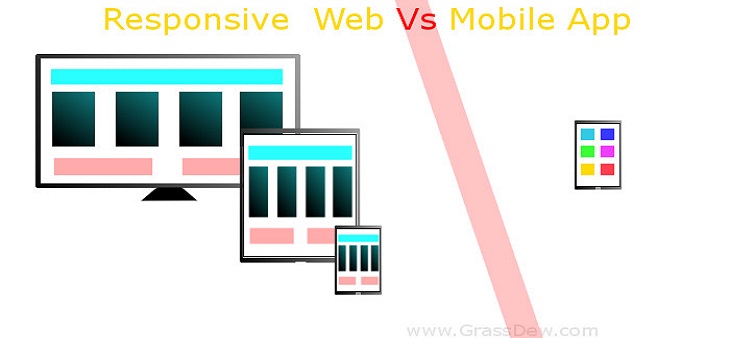
Recently I attained two different client meetings. One of these meetings, I took hard time to tell client that they don't really need mobile application while they are planning for Mobile Compatible Responsive Web.
You will be surprised to know in other meeting, I took even more hard time to explain my client that they need to have Mobile Compatible Responsive Web as well as Mobile App for iOS, Windows and Android.
Looks strange, huh?
In this article I am going to throw some light on this increasing and confusing areas for business software decision makers of companies.
Very easy and simple line - I always ask my clients that first step is to create a mobile compatible responsive website in developing a mobile web presence, whereas a mobile app is useful for
developing an application for a very specific purpose that cannot be effectively accomplished via a web browser.
Below are 5 Benefits of Mobile Compatible Responsive Web compared to Mobile Apps:
1. Immediacy – Webs Are Instantly Available
A mobile website is instantly accessible to users via a browser across a range of devices laptops, desktops, any mobile smart phones etc. Whereas Mobile Apps on the other hand require the user to
first download and install the app from an app marketplace before the content or application can be viewed or functionality used.
2. Compatibility
A single mobile website can reach users across many different types of mobile devices, whereas native apps require a separate version to be developed for each type of device. There is still way to develop cross platform mobile apps. You can refer my earlier article explaining about cross platform mobile app development.
3. Life-cycle – Mobile Websites Can’t be Deleted By Users
The average shelf-life of an app is pretty short, less than 30 days; so unless your app is something truly unique and/or useful (ideally, both), it’s questionable how long it will last on a user’s device.
Mobile websites on the other hand are always available for users to return to them.
4. Upgrade-ability – Mobile Websites Can Be Updated Instantly
A mobile website is much more dynamic than an app in terms of pure flexibility to update content. If you want to change the design or content of a mobile website you simply publish the edit once and the changes are immediately visible; updating an app on the other hand requires the updates to be pushed to users,
which then must be downloaded in order to update the app on each type of device.
5. Find-ability & Share-ability – Mobile Websites Can be Found and Shared Easily
Mobile websites are much easier for users to find because their pages can be displayed in search results and listed in industry-specific directories, making it easy for qualified visitors to find you. Mobile website URLs are easily shared
between users via a simple link (e.g. within an email or text message, Facebook or Twitter post). Publishers can easily direct users to a mobile website from a blog or website, or even in print. An app simply cannot be shared in this fashion.
They are few who actually are backbone of team work. You will find if such team mate is absent for some time in team, there is feeling of team is loosing something... delay in delivery etc etc. I really like to call them oxygen of the team.
Five Benefits When Does a Mobile App makes Sense?
1. Interactivity/Gaming
for any interactive games mobile app is almost always going to be your best choice.
2. Regular Usage / Personalisation
If your target users are going to be using your app in a personalised fashion on a regular basis (like Amazon shopping) then an app provides a great way to do that.
3. Complex Calculations or Reporting)
If you need something that will take data and allow you to manipulate it with complex calculations, charts or reports (think trade market, insurance, banking or investment sectors) a mobile app will help you do that very effectively.
4. Native Functionality or Processing Required
There are functionalities where you need to access camera of mobile phone, and other stuff like GPS location - it is easy to do using mobile apps.
5. May not need internet connection always
Mobile apps can work without internet too, when live data is not needed from server.
GrassDew has four main business streams – Consulting Services, Software Solutions, Security Services and Knowledge Services. Our primary focus is on various software development and maintenance services.
To know more about our services, email us at shekhar.pawar@grassdew.com